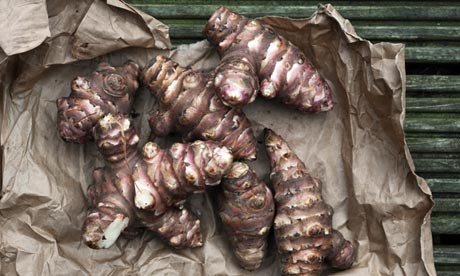
Jerusalem artichokes are a reason to be cheerful in January and February. Sweet and crunchy when raw, smooth and aromatic when cooked, these knobbly tubers shine like beacons on the lean, dark midwinter shopping list.
It's surprising they aren't a more commonplace seasonal vegetable. Jerusalem artichokes grow easily in the UK, displaying a dogged resistance to disease, a characteristic that endears them not only to organic growers, but also to consumers who'd prefer that their food didn't come with a garnish of pesticide. But their flavour is the clincher: more complex than the simple sugariness of carrots, more elegant than celeriac or parsnip.
There are, admittedly, a couple of bad points about Jerusalem artichokes. Either you must spend time cleaning them meticulously, or peel them generously. But since they are reliably cheap, we needn't consider that profligate. Then there's their oft‑reported habit of inducing flatulence. But surely a little hot air is worth it for a vegetable this special?
Why are they good for me?
Eat Jerusalem artichokes and you'll be topping up on important minerals. They are rich in iron to give you energy, along with potassium and vitamin B1, which support your muscles and nerves. Although they're sweet, their starchy fibre stops any spikes in blood sugar levels – indeed they have a lower glycemic index (GI) score than potatoes – and they aren't fattening.
Where to buy, what to pay?
A staple of organic veggie box schemes, and easy to find in traditional and farmers' markets, there's no guarantee you'll find them in supermarkets, but some do stock them. Expect to pay around £3.20-£3.50 per kilo.
• Joanna Blythman is the author of What To Eat (Fourth Estate, £16.99). To order a copy for £11 with free UK p&p, go to guardianbookshop.co.uk

